Get ready for back to school with these printables, activities, and teaching advice. Our icebreakers, classroom introduction lessons, and worksheets will help students and teachers learn about each other and feel more at ease in their new setting. Icebreaker games, questions, printables, and tips will help you learn and remember students' names. From greeting your students and outlining educational objectives to establishing classroom rules, you'll find the tools you need to prepare for your first day.
This fast-paced Wh questions game is ideal for practicing or reviewing question and answer forms. This game can be easily adapted to practice Wh questions and answers in any tense. On each card, students use the Wh question word to write a question about another student in the group that they know the answer for. The students then write the answer in sentence form underneath the question in the space provided.
Students then fold up the card and put it in an envelope. Next, students compete against each other to answer the questions. Students take it in turns to draw a card from the envelope and read the question to the group members.
The student who is the subject of the question is not allowed to answer. The first student to put up their hand can answer the question. The student's answer is checked against the one concealed behind the question. The student with the most cards at the end of the game wins.
Here is a useful getting to know you activity to use on the first day of class. First, students complete the worksheet with getting to know you questions that they would like to ask their partner. When the students have written 12 questions each, they take it in turns to ask and answer the questions with their partner. Students write their partner's answers in sentence form in the space next to each question. Afterwards, students introduce their partner to the class using the information. In this Wh questions game, students listen to a set of answers and try to guess the questions being asked.
Student A starts by reading the first answer on their worksheet to Student B. Student B listens and tries to guess the question. If Student B guesses correctly the first time, they score three points, on the second try two points, and on their last try one point. Student B then reads out their first answer and Student A tries to guess the question and so on. The student with the most points at the end of the game wins. Alternatively, you can make the game more competitive by having the students try to complete all the questions on their partner's worksheet in the fastest possible time.
In this entertaining Wh questions activity, students practice forming interview questions. Students then ask and answer the questions in a mystery celebrity interview. Each student starts off by thinking of a famous celebrity.
Students then use prompts on their worksheet to create interview questions. Students also create an interview question of their own at the end. Next, in pairs, students interview their partner using the script and questions and the other student answers the questions as their chosen celebrity.
Students note down their partner's answers in the second column of the worksheet. At the end of the interview, the interviewer guesses the name of the famous celebrity their partner is pretending to be. Finally, students do their interviews in front of the class and the class guesses the mystery celebrity. In this free icebreaker game, students give true and false personal information and their classmates ask questions to help them decide if the information is true or false.
First, students complete ten personal information statements on the worksheet. Five of the statements must be true and five must be false. Students indicate which statement is which by putting a tick for true or a cross for false. In groups of four, students then take it in turns to read their ten statements to the group.
As the students listen to each statement, they ask questions to help them decide if the reader is lying or telling the truth. Students then decide if the statement is true or false by marking their guess with a tick or cross. Afterwards, students reveal which statements were true and which were false.
Getting To Know You Questions Worksheet Pdf In this free asking Wh questions game, students guess Wh questions from short answers written by other students. The students write down a one or two-word answer for each question on their card and then cut the card so the questions and answers are separate. One student begins by placing their answers on the desk for the other two students to see.
These two students read the first answer and take it in turns to guess the Wh question. The first student to guess the question scores one point. In this fun icebreaker game, students guess information about a partner and form questions to ask them to find out the truth.
Assign each student with a partner from the other group, keeping the two groups separate. Working alone, students read the statements on their worksheet and indicate whether they think they are true or not for their partner. Next, students write down the questions they need to ask their partner to find out the truth. Students then pair up with their assigned partner and take it in turns to ask each other their questions. Students also ask follow-up questions to find out more details. The student with the most correct guesses wins the game.
In this imaginative Wh questions game, students play Tic-Tac-Toe by creating questions. Number the squares and write a question word in each square. Next, teams take it in turns to choose a question word from the grid. The students in the team use the question word in the square to make a Wh question. To win the square, the Wh question must be grammatically correct and contain a minimum of six words.
The next team must answer the question appropriately or they lose their turn to choose a square. If a question is grammatically incorrect or less than six words in length, play passes to the next team, without them having to answer a question. The aim of the game is for the teams to get three squares in a row. In this Wh questions worksheet, students practice writing Wh questions for a set of answers. Working alone, students write Wh questions for 20 answers on the worksheet. When the students have finished, they swap worksheets with a classmate for marking.
In this Wh questions activity, students complete missing words in questions and then use the questions to interview a partner. In pairs, students have ten minutes to complete the questions on the worksheet by deciding what the missing words are in each question. When the time limit has been reached, check the questions with the class. After that, the students take it in turns to choose a topic and use the questions to interview their partner. When all the questions have been asked, the students give feedback to the class on what they found out about their partner.
Here is a fun getting to know you activity for the first day of class to help students find out interesting facts about one another. When the students have finished, they share what they found out about each other in small groups and then with the class. This getting to know you speaking activity can be used as an icebreaker on the first day of class. Students take it in turns to pick up an alphabet card from the pile and look at the corresponding topic and question on the worksheet. The student then tells the group the topic and asks the other students the corresponding question.
Each student answers the question in turn and the students generate a short discussion on the topic. The next student then picks up an alphabet card and the process continues. When the students have finished, they share any interesting or surprising information they found out about their classmates. In this getting to know you questions activity, students interview each other and share personal information to find people who would make compatible flatmates. In pairs, students take it in turns to interview their partner by asking the get to know you questions on the worksheet and noting down the answers.
Students then compare their answers and decide if they would make good flatmates or not. Next, each pair joins with another pair and the students take it in turns to share their partner's answers with the group to see if they would be compatible with any other students. Afterwards, there is a class feedback session to find out who would make compatible flatmates. In this getting to know you activity, students practice asking for details to basic questions and building conversation.
In two groups, students write short answers to questions on the worksheet. Students then pair up with someone from the other group and give them their answers. Next, students take it in turns to ask their partner questions to find out more details about their answers using the language provided. Finally, students share what they found out about their partner with the class. Is a game-based learning platform that makes it easy to create, share and play learning games or trivia quizzes in minutes.
Whether you make the quiz about yourself, fun facts about your school or students, or even subject-based questions, your class will have a blast. In this challenging questions game, students practice asking questions to find out further details about an opening statement. The student replies to the questions with short imaginary answers.
After the two-minute time limit has been reached, the teams swap roles and a member of Team B gives an opening statement. The team with the most points at the end of the game wins. This engaging get to know you board game can be used as an icebreaker activity on the first day of class to help students talk about themselves and become acquainted with one another. Students take it in turns to roll the dice and move their counter along the board.
When a student lands on a square, they talk about the get to know you topic on the square. While the student is talking, the other students listen and ask follow-up questions or join in with their opinions. Using flashcards and game cards is of vital importance for teaching vocabulary at every stage of the class. Flashcards are an excellent way to present, practise and review vocabulary.
When teachers use flashcards in classroom activities, the students are more likely to have more fun and they can memorize the new words more easily. We provide esl printable flashcards both with words and without words, Vocabulary Learning Cards and Dominoes Games. One of the greatest investments I ever made for my classroom was in a simple set of Jenga style stacking blocks. It's a fun game and easy to play, but I wanted to add a language element and use it with my ESL students, so I wrote an icebreaker question on each block. I have groups of students play the game, and whatever block they pull, they have to answer the question on it. It's a great way to learn about each other without putting a lot of pressure on students, and the game aspect gives us all something to enjoy while we are answering questions.
In this Wh questions crossword activity, students create questions in order to elicit specific answers in a crossword. In two groups, students write down questions that would elicit the words and phrases on their crossword. Next, students pair up with someone from the other group. Students then take it in turns to ask their partner for a question to one of their missing words or phrases. Their partner then asks them the question for that word or phrase, indicating the number of words in the answer, e.g. one-word answer, two-word answer, etc. If the student guesses the answer successfully, they write in the missing word or phrase on their crossword.
If not, their partner continues to ask more questions until they are able to guess the answer. In this Wh questions speaking activity, students play a game where they ask Wh questions in order to find out more details about a sentence. Write a sentence on the board, e.g. 'The report is on the desk'.
Tell the students that they are feeling inquisitive and want to find out as many details as possible about the sentence. Teams then take it in turns to ask a Wh question about the sentence, e.g. 'What is the report about? ' For each grammatically correct question a team asks, they score one point.
When teams run out of questions, write a new sentence on the board and continue the game. In this icebreaker game, students talk about various topics and try to use specific linking words and phrases in their conversations. Each student takes a linking word card and the first topic card is turned over for everyone to see, e.g. ambitions. The students then get to know each other by having a conversation about the topic on the card for two minutes. As the students talk, they try to naturally work a sentence into the conversation that uses the linking word or phrase on their card.
When a student does this, they score a point and take another linking word card from the pile and continue, trying to use the next linking word or phrase. After a couple of minutes, the conversation ends and the students place all the linking word cards back in the pile and reshuffle them. The process is then repeated with the next topic card and so on. Keeping icebreakers simple for beginning students will get your class off to a stress free start, and this ice breaker is one of the simplest. Students take turns choosing a piece of paper from the jar and answering the question.




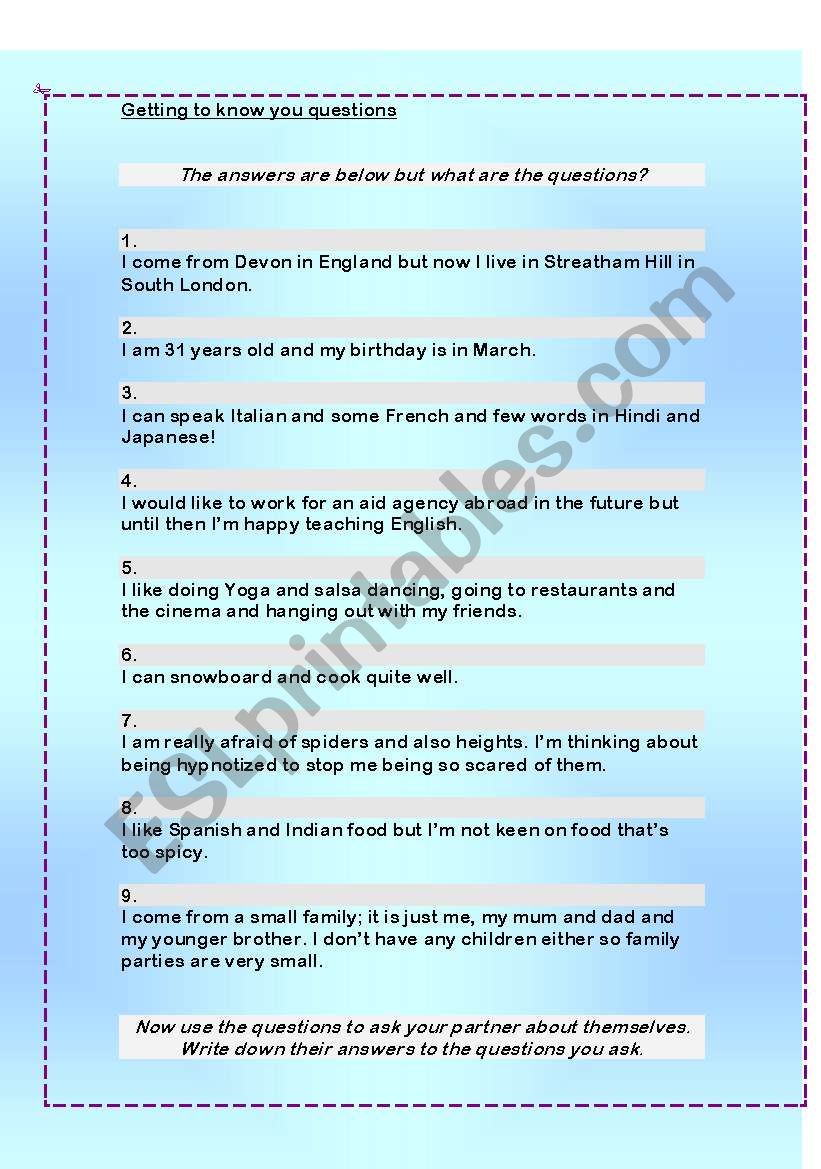





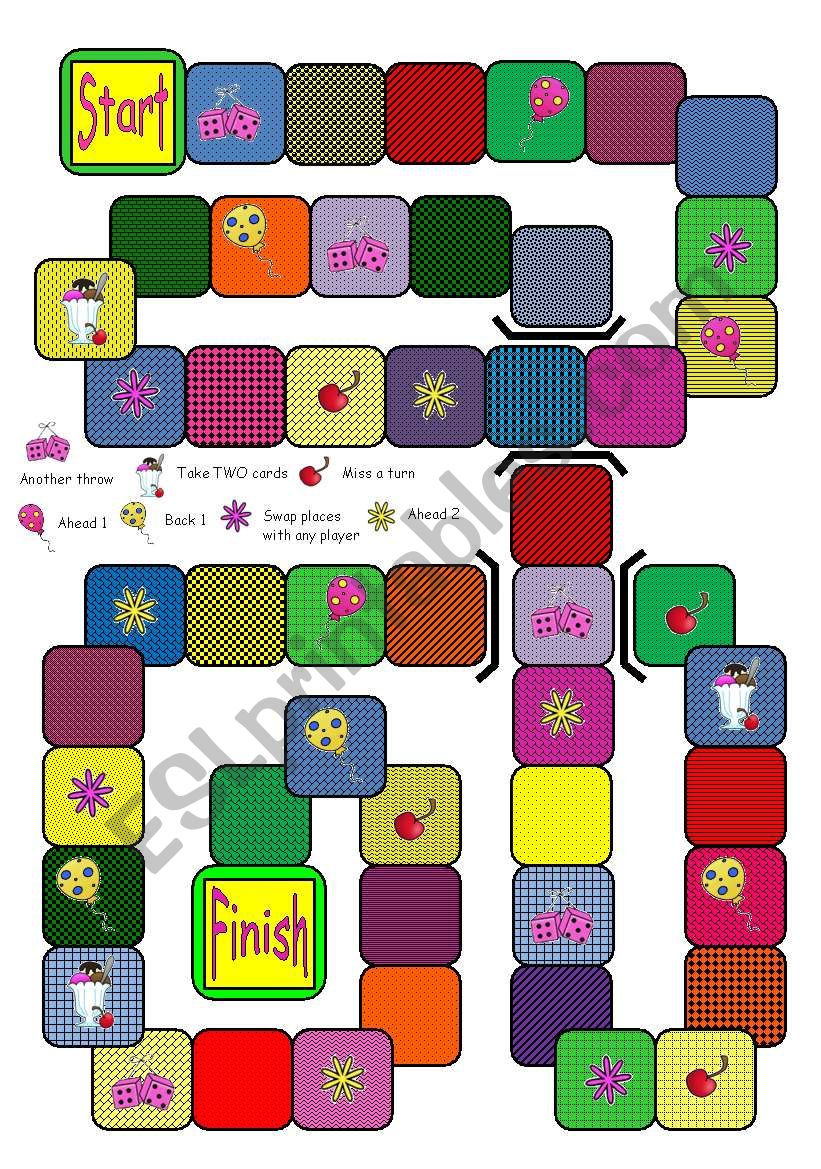






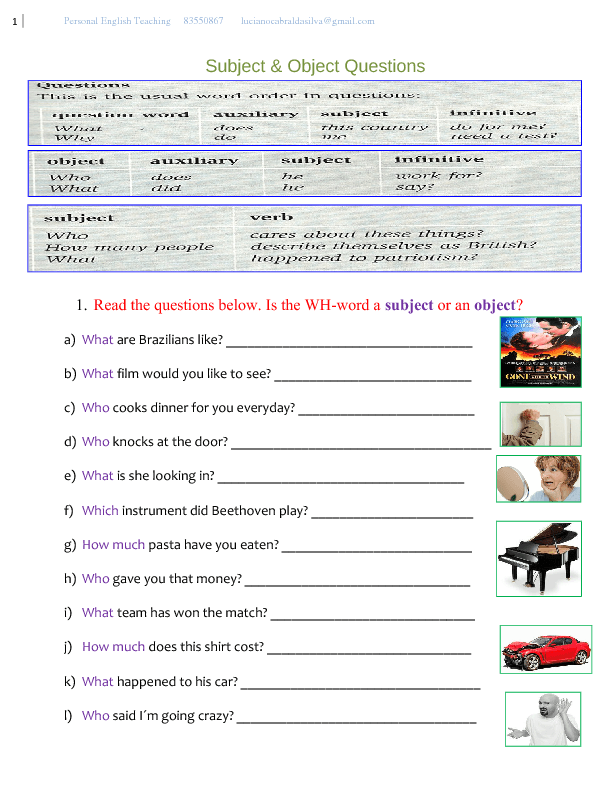
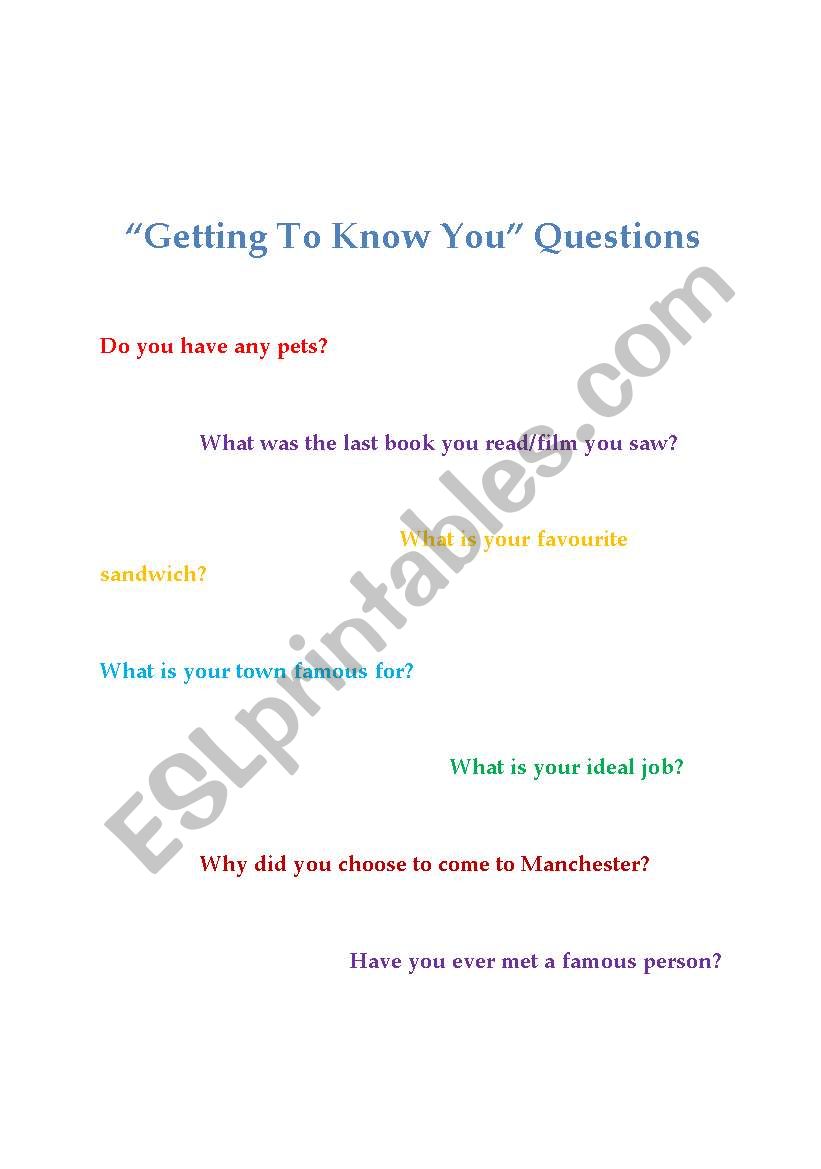





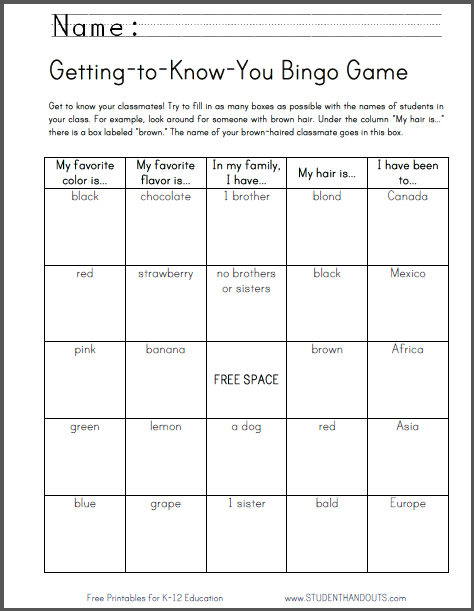

No comments:
Post a Comment
Note: Only a member of this blog may post a comment.